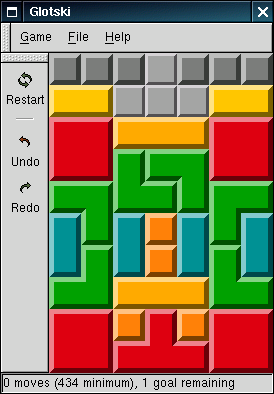📕 Description [en]
📜️ "blabla" 📜️
Debian :
Sliding block puzzle game, similar to Klotski.
Slide blocks around the puzzle until a certain goal condition is reached.
INTRODUCTION:
You wake up one day to realize that you have no real friends and have accomplished nothing of any real importance. You stare at yourself in the mirror and wonder why you even need to exist anymore. You begin to feel yourself slipping away from reality, slowly, almost completely unlike slipping on, say, a bar of soap. But as you begin to drift off, right before you lose your last shred of consciousness, something grabs you.
Something... blocky. Yes. The blocks. You must slide them. They must be slid. No one, but you, can slide these blocks. Your life takes on meaning as you begin sliding the blocks around, and around, and around...
IMPORTANT INFORMATION:
Since its original release, the game has actually gotten so it resembles a real application. This is good. Of course, it is not done yet.
The game is named Glotski, which rhymes with.. not free? But, as you realized, this game is entirely free (as in speech), unlike Klotski, a game for Microsoft Windows, which therefore this game obviously isn't.
This game requires a relatively recent version of Gnome, one that has a canvas that actually works.
HOW TO PLAY:
Start the game by either running 'glotski -f ' where the argument (required) is the name of a level file, or simply running 'glotski' and using the file dialog that pops up. The level may either be present in your path or, if not, in LEVELPATH (defined at time of compile; default is /usr/local/games/glotski/). The file dialog will start in the LEVELPATH directory.
A level consists of a series of square-based blocks, which may be slid around on a rectangular grid by dragging them around with the left mouse button. Blocks may not overlap. You have a series of goals in mind (usually just one). You must move the blocks around until they match each of these goal patterns. Usually the goal is as simple as "move a certain block to a certain place on the grid" but it can be more complex (like "mirror the entire playing field vertically"). Look in the little "Goal" window to see what it is you're supposed to do. It is possible to make the goal ambiguous, by having two pieces that look similar have different meanings, but then it is also possible to make the goal impossible to attain, so you must have trust in the level author.
Usually these goals are fairly hard to attain. I personally am not very good at attaining them. I wrote this game because I liked the commercially sold game "Rush Hour" by Binary Arts and I wanted to create something like it. I soon realized that Rush Hour was far too specialized a case. Currently the game is a very large superset of Rush Hour. I also wrote it when I read the fabulous book _Sliding Piece Puzzles_ by L. E. Hordern and realized the wealth of sliding block puzzles that were out there.
FILE FORMAT:
The level file format is very similar to the file format of the puzzles found at Nick Baxter's Sliding Block Home Page at:
https://www.johnrausch.com/SlidingBlockPuzzles/
Currently, I do not support textures for the blocks. I also support an additional directive, type, which takes the format:
type x typename
where x is one of the piece identifiers, and typename is one of: [ihvb] for immobile, horizontally movable, vertically movable, and both axes movable, respectively. Oh, and I support multiple targets (goals). This is handy for levels like "Marco Polo" (which I have not packaged). Put the goals in the order of the last one you want fulfilled first.
The interface is not finalized, but I'm pretty satisfied with it. I'll probably add some more features eventually. The parser is not that great when it's given an invalid level, but it seems to work fine for valid ones. (And it will give you a bit of a clue what you did wrong if it's invalid.) Oh, and I may as well switch over to an autoconf build process
(I need to learn how to use that - nobody help me this time!)
A NOTE ABOUT THE PACKAGED LEVELS:
I have decided to only package level files that I am as sure as I can be are in the public domain. These are levels that were either patented quite some time ago and thus the patents have expired, or were manufactured by several unrelated companies and thus have been established as generic. If someone wants to provide me with advice about this issue, I certainly would welcome it. Furthermore, if anyone makes any puzzles that they want included, contact me. (You will retain copyright, but they will be placed under the GPL.) Some "Rush Hour"-ish puzzles as well as puzzles with multiple goals would be nice; there currently are no such puzzles distributed. The more puzzles I can include, the better. The puzzles are currently all taken from Hordern's book.
And that's about it for now... What, were you expecting more for free?

